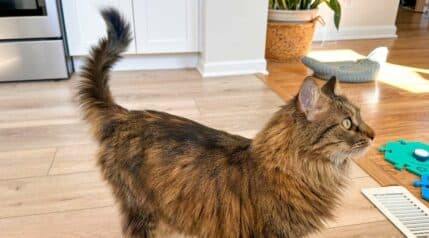When you purchase through links on our site, we may earn a commission. Here’s how it works.
As a pet parent, you know that, unfortunately, your cat will sometimes get into things that can get them into trouble. If your cat accidentally chews or eats a piece of plastic, you are undoubtedly worried that your buddy will suffer serious health complications. The severity of this situation is dependent upon the type of plastic eaten.
Can cats digest plastic? Can you treat your cat at home if they ingest a plastic item, or should you contact the vet? We’ll cover all this and more in this article.
Can Cats Digest Plastic?
Accidents happen, and when your cat eats plastic, you’re sure to wonder if they can digest the item. Unfortunately, plastic is not digestible. If your cat swallows a plastic object, they risk having a physical obstruction in their digestive system, preventing food and water from passing through the stomach or small intestines.
A chewed-up piece of plastic can become lodged in the throat or digestive system and cause choking, cuts, or inflammation. Sharp fragments can pose a risk of perforating the stomach or small intestine. These tears can cause leaky gut and infection. Symptoms of gastrointestinal obstruction include:
- drool and vomiting
- dark, bloody stools
- decreased appetite
- lethargy
- anorexia
- behavioral changes
- abdominal pain
If you fear your cat has ingested plastic, it’s essential to recognize these symptoms and assess your cat’s condition. You may need to seek medical attention.
What Should I Do If My Cat Ate Plastic?
If you see your cat chewing on or eating plastic, remove your cat from the area and eliminate any trace of remaining plastic. Identify the object and anything that might have been in it. In the case of plastic-wrapped items, some ingredients like chocolate, sugar-free gum, and other chemicals might be harmful to your cat’s health in addition to the plastic.
If you think your cat has consumed plastic, contact your veterinarian. While your cat may seem fine, your vet will be able to advise you more efficiently. Tell your vet how much plastic was consumed, what type of object the cat ate, and whether it contained any other harmful ingredients. Your vet may have you watch and wait, or you’ll need to bring your cat into the clinic for an examination. Speedy treatment is critical to ensure your cat’s well-being.
How Will The Vet Confirm If My Cat Ate Plastic?
Your veterinarian will conduct a physical exam first, checking your feline’s heart rate, temperature, and hydration status. They will check for signs of bloating or pain in the abdomen. Your vet may then wish to run additional tests, from blood samples to X-rays.
Diagnostic imaging will show evidence of a blockage. An X-ray will show where a complete plastic item is located. Your vet may also perform an ultrasound to scan your cat’s organs or an endoscopy, where a long, bendable camera enters the stomach to find and remove foreign objects.
Surgery will be necessary if the object is stuck in the digestive tract and can’t be removed using an endoscope. Abdominal surgery allows your vet to examine the organs for obstruction and remove all plastic pieces.
Will My Cat Be Ok After Eating Plastic?
In most cases, your cat will be fine after eating plastic. In some situations, your vet may advise you to monitor your cat and confirm the item passes through the digestive system. This watch-and-wait is a standard method if your cat consumes only a tiny amount of plastic and shows no adverse reaction.
Small pieces of cellophane or a plastic bag may pass through the digestive system without any issue; however, large or sharp plastic may cause a painful and dangerous blockage. For small items, gut transit time will vary from cat to cat, but expect to see the thing in the litter box after one to two days.
Quick treatment is vital to prevent internal damage if your cat eats a large or sharp plastic item. Always contact your veterinarian for guidance. If caught and treated early, the prognosis is good. Your cat will likely have a full recovery.
Plastic may damage your cat’s organs and cause life-threatening complications if untreated. If a piece of plastic creates a hole in the gut lining, infection will likely follow. Peritonitis is inflammation of the abdominal lining caused by perforation of the gut lining, and this is a severe and often fatal condition. Other less serious conditions include pancreatitis, a painful inflammation of the pancreas, or inflammatory bowel disease (IBS).
How Can I Stop My Cat From Eating Plastic?
While it’s adorable to see your cat go crazy for something as simple as a hair band or plastic wrapper, you shouldn’t allow your cat to indulge in this type of play. Instead, add some spice to your cat’s daily play by introducing new cat-safe toys. There are so many types of toys on the market that you will find some that please your furball.
If you notice your cat nibbling on a plastic, provide a toy or treat to draw their attention and remove it from your cat’s reach. Ensure trash cans are secured, so your cat doesn’t dig through the garbage while away to retrieve their precious “toy.” Like most negative behaviors, keeping your cat mentally stimulated and active will prevent boredom and reduce destructive behaviors.
To stop your cat from eating plastic, try the following:
- Regularly play with your cat to avoid attention-seeking behavior like biting foreign objects
- Use cat toys, especially prey-mimicking toys, when playing with your cat to keep them occupied and help them satisfy their predator instinct
- Provide plenty of scratching spots so your cat can relieve stress and expel excess energy
- Keep your cat occupied while you’re away by investing in puzzle toys
- Train your cat not to eat plastic by hiring a professional trainer
- Visit the vet to determine if there is an underlying health problem causing the chewing
Frequently Asked Questions
Why Does My Cat Eat Plastic?
There are numerous reasons why your cat might be eating undigestable objects. If the plastic in question is a bag or wrapper, it could be that your cat is smelling something in it. If your cat smells food, they may want to lick or bite the part of the plastic that came in contact with the food. Your cat’s predatory instinct may be at work for straws, tinsel, or other small items. The plastic pieces act as prey, and your cat’s reflex is to attack and bite the thing.
While some cats are simply curious about the world around them, eating plastic could also be a sign of pica, a condition where cats eat non-food items. Symptoms of pica include:
- Anxiety and stress
- Nutritional deficiency
- Dental problems or teething
- Early weaning
- Compulsive disorder
- Hyperthyroidism
If you are concerned your cat has pica, consult with your veterinarian. Your vet will determine what’s causing pica and select the best treatment option. Treatment of pica usually involves making dietary and lifestyle changes or giving your cat medication to treat the underlying condition.
Do Cats Grow Out Of Pica?
While some cats grow out of pica as they age, that’s not always the case. Medical intervention is crucial to stop pica quickly and minimize the adverse effects of pica in felines, so contact your veterinarian as soon as you can.
Will My Cat Die From Eating Plastic?
Depending on the ingested plastic, yes, it is possible that eating plastic is fatal. Felines aren’t able to digest plastic, and if the item is large enough, it could create a life-threatening blockage. For this reason, you must contact your vet if you notice signs of digestive obstruction.
Final Thoughts
Consuming foreign objects like plastic is relatively common in cats, especially for kittens who are weaned early or are teething. Fortunately, many cats grow out of chewing items as they age. Giving your cat plenty of attention via play and support during times of stress is a great way to promote a healthy lifestyle free of chewing.





